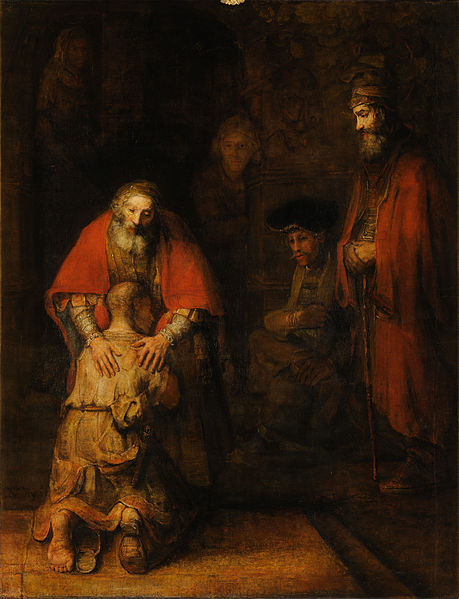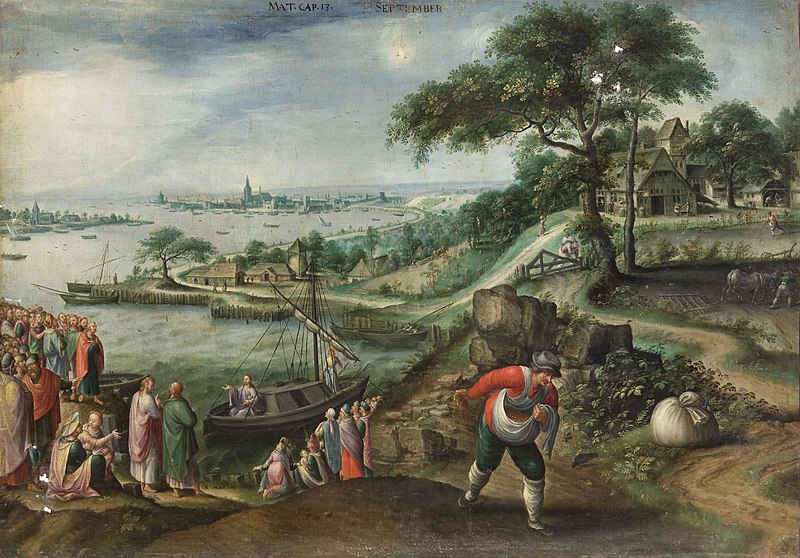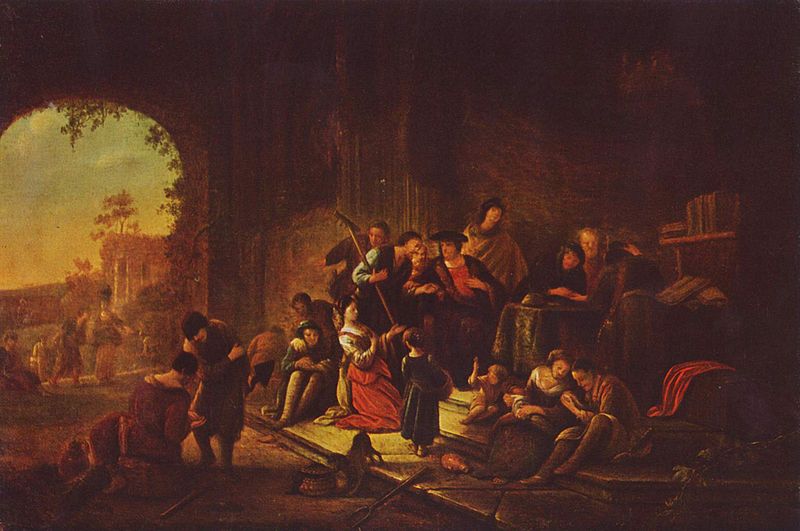Parables in the Bible hold a significant place within Christian teachings. Jesus Christ, in particular, frequently used parables as a method of conveying spiritual and moral lessons to His disciples and the crowds that gathered to listen to Him.
These parables are found in the Synoptic Gospels—Matthew, Mark, and Luke—and they offer timeless wisdom that continues to resonate with believers today.
Biblical parables are concise, relatable stories used by Jesus to teach spiritual and moral lessons. They employ familiar settings and characters, inviting personal reflection and offering practical guidance for righteous living.
These timeless narratives engage both crowds and individuals, encouraging introspection and personal transformation.
The open-ended nature of the parables allows for various interpretations, making them a rich source of inspiration and guidance for Christians seeking deeper understanding and spiritual growth.
Famous Parables
1. The Parable of the Good Samaritan
The Parable of the Good Samaritan is a famous story from the Bible, found in the Gospel of Luke (Luke 10:25-37).
In this parable, a religious expert tests Jesus by asking Him what he must do to inherit eternal life. Jesus responds by telling the story of a man who is robbed, beaten, and left by the side of the road.
A priest and a Levite, both considered religious and respectable figures, pass by the injured man without offering help.
However, a Samaritan, someone from a despised group by the injured man’s people, comes across him. The Samaritan shows compassion, tending to the man’s wounds, bringing him to an inn, and paying for his care.
The parable teaches the importance of showing mercy and compassion to others, regardless of their social status, ethnicity, or background. It challenges listeners to extend love and care to those in need, emphasizing that true neighborliness transcends societal divisions.
2. The Parable of the Prodigal Son

The Parable of the Prodigal Son is a well-known story from the Bible, found in the Gospel of Luke (Luke 15:11-32). It tells the story of a father and his two sons. The younger son asks for his inheritance in advance and goes to a distant country, where he squanders all his wealth on reckless living.
When a famine strikes, the younger son finds himself in desperate need and decides to return home, hoping to work as a servant for his father. However, upon seeing his son returning, the father runs to him, embraces him, and throws a lavish celebration to welcome him back.
The older son, who had remained faithful to the father, becomes resentful and questions the father’s actions. But the father explains that it is cause for joy because the lost son has returned.
The parable illustrates the themes of forgiveness, unconditional love, and redemption. It demonstrates the father’s unconditional love for his wayward son, regardless of his mistakes and shortcomings. It also highlights the older son’s struggle with resentment and the need for forgiveness and understanding.
The Parable of the Prodigal Son encourages listeners to reflect on their own relationships with God and others. It teaches that no matter how far one may stray or how deep one’s mistakes, there is always an opportunity for repentance, forgiveness, and reconciliation.
It emphasizes the boundless grace and mercy of God and the importance of extending forgiveness and compassion to others.
3. The Parable of the Mustard Seed
The Parable of the Mustard Seed is a brief but powerful story shared by Jesus in the Bible, appearing in the Gospels of Matthew (Matthew 13:31-32), Mark (Mark 4:30-32), and Luke (Luke 13:18-19). In this parable, Jesus compares the Kingdom of Heaven to a mustard seed.
Jesus explains that the mustard seed, which is one of the smallest seeds, grows into a large tree. This tree provides shelter and nests for birds. The parable emphasizes the remarkable growth and impact that arises from humble beginnings.
The Parable of the Mustard Seed carries a profound message about the Kingdom of Heaven. It signifies that although the Kingdom may have humble and seemingly insignificant beginnings, it will expand and flourish to encompass and benefit many.
It represents the transformative power of God’s work, where something small and seemingly insignificant can have a significant and far-reaching impact.
This parable encourages believers to have faith and trust in the growth and impact of God’s Kingdom, even when it appears small or insignificant at its inception.
It reminds individuals that their contributions, no matter how small they may seem, can have a significant influence when rooted in God’s purpose and nurtured with faith.
4. The Parable of the Lost Sheep

The Parable of the Lost Sheep is a well-known story shared by Jesus in the Bible, found in the Gospel of Matthew (Matthew 18:12-14) and the Gospel of Luke (Luke 15:3-7). In this parable, Jesus tells the story of a shepherd who has a hundred sheep but realizes that one of them is missing.
The shepherd leaves the ninety-nine sheep in the open field and goes in search of the lost sheep. When he finds it, he joyfully carries it on his shoulders and returns home.
He then gathers his friends and neighbors to celebrate, saying that there is more rejoicing over one lost sheep that is found than over the ninety-nine that did not go astray.
The parable carries a powerful message of God’s love and care for every individual. It illustrates that God is like a shepherd who actively seeks out those who have strayed or become lost in their lives. It emphasizes the immense value God places on each person and the joy that comes when someone who was lost is found and restored.
The Parable of the Lost Sheep conveys the message that God’s love is relentless and unconditional. It shows that no matter how far someone may wander or how lost they may feel, God is actively pursuing them, ready to extend forgiveness, grace, and reconciliation.
5. The Parable of the Talents
The Parable of the Talents is a well-known story shared by Jesus in the Bible, found in the Gospel of Matthew (Matthew 25:14-30). In this parable, a master entrusts his property to his servants before going on a journey. To each servant, he gives a different number of talents, a unit of currency.
Two of the servants wisely invest and multiply the talents they received. However, one servant, out of fear, buries his talent and fails to put it to good use. When the master returns, he rewards the two servants who multiplied their talents, but he condemns the third servant for his lack of initiative and squandering the opportunity.
The parable teaches the principles of stewardship, responsibility, and faithfulness. It highlights the importance of using the resources and gifts we are given for productive purposes and to benefit others. It also warns against fear and complacency, urging believers to actively engage and invest in the work of the Kingdom.
The Parable of the Talents conveys the message that God has entrusted each person with unique abilities, resources, and opportunities.
It encourages believers to use those gifts wisely and to be diligent in their efforts to make a positive impact in the world. It emphasizes that God expects us to be good stewards of what we have been given and to actively participate in the growth and advancement of His purposes.
6. The Parable of the Sower

The Parable of the Sower is a famous story shared by Jesus in the Bible, appearing in the Gospels of Matthew (Matthew 13:1-23), Mark (Mark 4:1-20), and Luke (Luke 8:4-15). In this parable, Jesus compares the Kingdom of God to a sower who scatters seeds.
As the sower throws the seeds, they fall on different types of soil. Some seeds fall on the path, where birds quickly eat them. Some fall on rocky ground with little soil, and although they initially sprout, they wither due to a lack of root.
Other seeds fall among thorns, which choke them and prevent their growth. Finally, some seeds fall on good soil, where they grow and produce a bountiful harvest.
The parable explains that the seeds represent the message of the Kingdom of God, while the different types of soil represent the various responses of people to that message. It teaches that some people hear the message but do not understand it, allowing the evil one to snatch it away.
Others receive the message with joy but quickly abandon it when faced with challenges or persecution. Still, others allow worldly concerns and distractions to hinder their growth in faith. However, there are those who receive the message with an open heart, understand it, and bear fruit by living out the teachings of the Kingdom.
The Parable of the Sower emphasizes the importance of the condition of the heart and the readiness to receive and respond to God’s message. It highlights the need for receptivity, understanding, and perseverance in faith.
It encourages individuals to cultivate good soil in their hearts, free from hardness, shallowness, and distractions, so that the seed of God’s word can take root, grow, and bear abundant fruit.
7. The Parable of the Ten Virgins
The Parable of the Ten Virgins is a story shared by Jesus in the Bible, found in the Gospel of Matthew (Matthew 25:1-13). In this parable, Jesus describes ten virgins who were waiting for the arrival of the bridegroom to start the wedding festivities.
Five of the virgins were wise and came prepared with enough oil for their lamps, while the other five were foolish and did not bring extra oil. As they waited, their lamps began to run out of oil. When the bridegroom finally arrived, the prepared virgins went inside with him, and the door was shut. The unprepared virgins, who had to go buy more oil, were locked out and missed the celebration.
The parable conveys the importance of preparedness and readiness for the return of Christ and the coming of the Kingdom of God. The wise virgins represent those who are spiritually prepared, actively living out their faith, and eagerly awaiting the arrival of the bridegroom, which symbolizes the return of Jesus. They are ready to enter into the joy of the Kingdom.
On the other hand, the foolish virgins represent those who are spiritually unprepared and lacking in diligence. They are caught off guard and unprepared when the bridegroom arrives. Their lack of extra oil symbolizes their lack of commitment, faithfulness, and spiritual preparedness.
The parable serves as a call to believers to be vigilant, spiritually awake, and prepared for the return of Christ. It emphasizes the importance of a genuine and enduring faith, as well as the need to actively live out the teachings of Jesus, being filled with the Holy Spirit, and cultivating a personal relationship with God.
8. The Parable of the Workers in the Vineyard

The Parable of the Workers in the Vineyard is a story shared by Jesus in the Bible, found in the Gospel of Matthew (Matthew 20:1-16). In this parable, Jesus tells of a landowner who hires workers for his vineyard at different times throughout the day.
The landowner agrees to pay the first group of workers a denarius, a fair day’s wage. As the day progresses, he hires more workers, stating that he will pay them what is right. Finally, even as the workday is almost over, he hires additional workers.
At the end of the day, when it’s time for the wages to be distributed, the landowner begins with the workers who were hired last. Surprisingly, he gives them a denarius. Seeing this, those who were hired first expect to receive more, but they also receive a denarius.
They complain to the landowner, feeling that it’s unfair since they had worked longer hours. The landowner reminds them that they had agreed to work for a denarius and that he has the right to be generous to whomever he chooses.
The parable teaches about the generosity and grace of God. It emphasizes that God’s kingdom does not operate on the principles of fairness and human expectations but rather on His abundant grace and mercy. It challenges the notion of entitlement and self-righteousness, encouraging a spirit of gratitude and humility.
The Parable of the Workers in the Vineyard reminds believers that God’s grace extends to all, regardless of their background or the timing of their acceptance of His invitation. It emphasizes that salvation is a gift of grace and not something that can be earned through human efforts or merit.
9. The Parable of the Rich Fool
The Parable of the Rich Fool is a story shared by Jesus in the Bible, found in the Gospel of Luke (Luke 12:16-21). In this parable, Jesus tells of a rich man who had a bountiful harvest, resulting in an abundance of crops.
The man decides to tear down his old barns and build larger ones to store all his goods, thinking that he can now relax, eat, drink, and enjoy his wealth for many years to come.
However, God intervenes and tells the rich man that his life will be demanded of him that very night. Jesus concludes the parable by saying, “This is how it will be for whoever stores up things for themselves but is not rich toward God.”
The parable warns against the dangers of greed, materialism, and the pursuit of earthly possessions without considering one’s relationship with God. It highlights the folly of placing one’s security and identity solely in wealth and possessions, neglecting spiritual matters and the bigger purpose of life.
The Parable of the Rich Fool serves as a reminder that true riches and fulfillment are found in a relationship with God and in being generous toward others. It challenges the idea of accumulating wealth for personal gain and prompts believers to prioritize spiritual wealth and investing in the Kingdom of God.
10. The Parable of the Wise and Foolish Builders
The Parable of the Wise and Foolish Builders is a well-known story shared by Jesus in the Bible, found in the Gospel of Matthew (Matthew 7:24-27) and the Gospel of Luke (Luke 6:46-49).
In this parable, Jesus compares two builders: one who builds his house on a solid foundation of rock and another who builds his house on unstable sand.
The wise builder carefully selects a firm foundation of rock and constructs his house upon it. When storms and floods come, the house remains standing because of its solid foundation. In contrast, the foolish builder chooses to build his house on the shifting sand. When the storms and floods arrive, the house collapses, having no foundation to support it.
The parable teaches the importance of a strong and solid foundation in life. It symbolizes the need for a firm and unwavering commitment to the teachings of Jesus and a personal relationship with God. The rock represents the Word of God and living according to His principles, while the sand represents a superficial faith or a reliance on worldly values and wisdom.
The Parable of the Wise and Foolish Builders emphasizes that hearing and acknowledging the teachings of Jesus is not enough. It calls for active obedience and putting His teachings into practice, which serves as the solid foundation for a life that can withstand the trials and challenges that come.
11. The Parable of the Unforgiving Servant
The Parable of the Unforgiving Servant is a story shared by Jesus in the Bible, found in the Gospel of Matthew (Matthew 18:21-35). In this parable, Jesus tells of a servant who owed a massive debt to his king.
Unable to repay the debt, the servant begs for mercy and forgiveness. Surprisingly, the king shows great compassion and forgives the entire debt, releasing the servant from his obligation.
However, immediately after being forgiven, the servant encounters a fellow servant who owes him a small amount of money. Instead of extending the same mercy and forgiveness he had received, the servant seizes his fellow servant, demands payment, and refuses to show any leniency.
When the king hears about this, he becomes enraged and orders the unforgiving servant to be thrown into prison until he repays his original debt.
The parable teaches the importance of forgiveness and the need for believers to extend the same forgiveness they have received from God to others. It highlights the immense debt that humanity owes to God, representing our sins and transgressions. Just as the king forgave the servant’s enormous debt, God offers His forgiveness and mercy to those who seek it with repentant hearts.
The Parable of the Unforgiving Servant emphasizes the inconsistency and hypocrisy of accepting God’s forgiveness while refusing to forgive others. It emphasizes that forgiveness is not a one-time act but an ongoing attitude and practice that should permeate the lives of believers.
Refusing to forgive others demonstrates a lack of understanding and gratitude for the forgiveness we have received from God.
12. The Parable of the Pearl of Great Price
The Parable of the Pearl of Great Price is a story shared by Jesus in the Bible, found in the Gospel of Matthew (Matthew 13:45-46). In this parable, Jesus describes a merchant who is seeking beautiful and valuable pearls. One day, he finds a pearl of exceptional value. Recognizing its worth, the merchant sells everything he owns in order to acquire that one precious pearl.
The parable conveys the idea that the Kingdom of Heaven is of such surpassing value that it is worth giving up everything else in order to possess it. It teaches that when one discovers the true worth and significance of God’s kingdom, nothing else compares in value or importance.
The Parable of the Pearl of Great Price emphasizes the need for wholehearted commitment and prioritizing the eternal over the temporary. It challenges believers to reevaluate their priorities and willingly sacrifice anything that hinders their pursuit of the Kingdom of God.
The parable also highlights the joy and satisfaction that come from finding and embracing the truth and richness of God’s kingdom. It encourages believers to seek and treasure the spiritual treasures and blessings that God offers, recognizing their immeasurable value.
13. The Parable of the Good Shepherd
The Parable of the Good Shepherd is a story shared by Jesus in the Bible, specifically in the Gospel of John (John 10:1-18). In this parable, Jesus portrays Himself as the Good Shepherd who cares for His sheep.
Jesus explains that a true shepherd enters the sheepfold through the gate, while a thief or robber tries to enter by climbing over the wall. The sheep recognize the voice of their shepherd and follow him, while they ignore the voice of strangers.
Jesus further describes Himself as the gate for the sheep. He states that whoever enters through Him will find safety, pasture, and abundant life. He contrasts Himself with thieves and robbers who come to steal, kill, and destroy.
The parable illustrates the loving and protective nature of Jesus as the Good Shepherd. It emphasizes His deep care for His followers, whom He refers to as His sheep. He knows them individually, leads them, and is willing to sacrifice His life for their well-being.
The Parable of the Good Shepherd conveys the idea that Jesus offers guidance, security, and abundant life to those who choose to follow Him. It highlights the importance of recognizing and responding to His voice, while discerning and avoiding the deceptive influences of the world.
